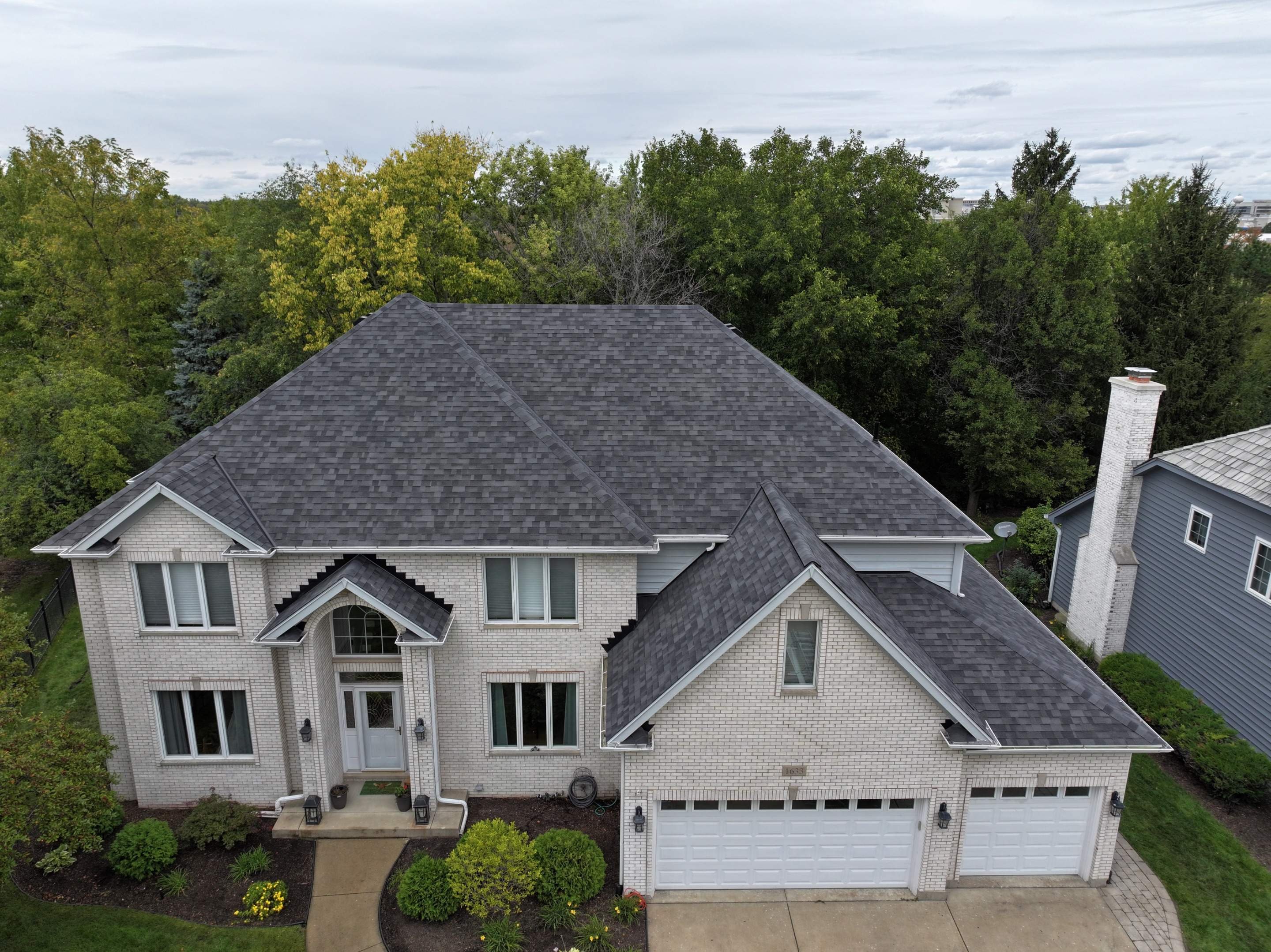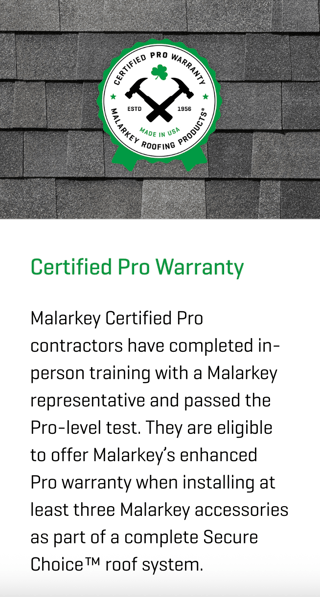Roofing Warranties Explained: What They Actually Cover (And What They Don't)

If you've been planning a roofing project, chances are you've seen contractors mention manufacturer, workmanship, and lifetime warranties.
Given their popularity, it's easy to assume that these warranties guarantee your roof is fully covered no matter what happens. The reality is that these warranties are only valid under specific conditions, and each one comes with its own limitations.
Understanding how warranties work, what's covered, what isn't, and what could void them is critical before you make a major investment like a roof replacement. At Happy Roofing, we've guided hundreds of Naperville-area homeowners through the warranty process, helping them comprehend exactly what's included.
In this article, we'll break down the main types of roofing warranties, the key warranty terms to understand, and why these details matter.
Table of Contents
- The Different Types of Roof Warranties
- Comparing Roof Warranties
- Which Warranty Details Matter the Most?
- What to Do If You Don't Understand Your Roof Warranty
What Are the Different Types of Roof Warranties?
Roofing warranties generally fall into three main categories: manufacturer, extended, and workmanship warranties. Each type is designed to protect something different.
Understanding these distinctions is key to understanding what coverage you have. Here's how they compare:
What is a Manufacturer's Material Warranty
A manufacturer's warranty comes directly from the shingle manufacturer and covers defects in the roofing materials themselves (like shingles that fail prematurely due to a manufacturing flaw). It is the most common warranty homeowners hear about.
- What's covered: Protection against defects in shingles or other roofing materials made by the manufacturer. For example, if shingles begin to crack, blister, lose adhesion, or prematurely lose granules (the protective, coated layer applied to shingles meant to provide protection and color) due to a manufacturing flaw, the manufacturer is responsible for replacing them.
- What's not covered: While the materials are covered as part of the manufacturer's warranty, labor for replacement and disposal isn't typically included. Additionally, issues found to be caused by improper installation, poor ventilation, or severe weather events will not be covered. If your contractor doesn't follow installation standards, your attic isn't ventilated properly, or a storm is the cause of the damage, the manufacturer will likely deny a claim.
Homeowner takeaway: A manufacturer's warranty only helps if their materials cause an issue, not the installation. If your claim is found to be caused by poor workmanship or underlying issues like poor ventilation, this warranty won't cover replacement.
What Do Extended Warranties Offer?
Some manufacturers offer extended (system) warranties if the roof was installed by a manufacturer-certified contractor and they used a certain number of their brand's components (starter shingles, ridge shingles, underlayment, ice and water shield, etc.).
Certified contractors undergo specialized training and complete rigorous testing from the manufacturer to qualify.
- What's covered: Extended or "system" warranties can stretch coverage beyond the standard warranty terms, sometimes up to 50 years or more. Many also cover the labor costs of removing and reinstalling defective components, which can save thousands of dollars compared to a standard warranty that only covers the materials. Additional costs like disposal fees may also be provided if the full roofing system (shingles, underlayment, and accessories) is installed by a manufacturer-certified contractor.
- What's not covered: Even with extended warranties, everything must be installed to the manufacturer's exact standards. If the contractor skips a required component, installs the system incorrectly, or isn't certified, the roof won't qualify for an extended warranty. On top of that, exclusions still apply: storm damage, lack of maintenance (like clogged gutters or poor ventilation), and homeowner neglect can all disqualify coverage. These warranties are powerful, but they're not an "anything goes" level of protection.
Homeowner takeaway: Extended warranties can provide strong coverage, but only if your contractor installs everything correctly and you maintain your roof according to the terms. They're not a blanket guarantee — they're conditional on strict rules.
What Are Workmanship Warranties?
Workmanship, or installation, warranties are offered by the roofing contractor directly and are completely separate from the manufacturer. These cover errors made during installation and the overall quality of the crew's work.
Not all roofing contractors offer workmanship warranties, and the length of coverage varies for those that do include them.
- What's covered: Coverage varies by contractor, but typically includes leaks and other premature material failure that is found to be caused directly by installation errors. For example, if water starts seeping in around a chimney because the flashing wasn't sealed correctly, the workmanship warranty should cover the repair. Some contractors may even include the labor to fix these mistakes at no additional cost.
- What's not covered: Material defects (those fall under the manufacturer's warranty), storm damage, or issues caused by neglect won't be covered under workmanship warranties. Also, workmanship warranties can vary greatly in length; some are just a year or two, while other contractors may offer 10 years or even "lifetime" warranties.
Homeowner takeaway: This is one of the most important warranties to pay attention to, because most roofing issues stem from installation errors — not defective shingles. Even the best materials will fail if they're installed incorrectly. Be sure to ask your contractor how long their workmanship warranty lasts, what it specifically covers, and
Comparing the Main Types of Roofing Warranties
| Warranty Type | Who Provides It | What's Covered | What's Not Covered |
|---|---|---|---|
| Manufacturer's Warranty | Shingle manufacturer | Defects in shingles or roofing materials (e.g., cracking, blistering, loss of adhesion, premature granule loss due to a manufacturing flaw). | Installation errors, poor ventilation, storm damage, or anything outside of material defects, labor for replacements |
| Extended Warranty | Manufacturer (requires certified contractor & full system of branded components) | Longer coverage periods (sometimes 50+ years), labor costs to replace defective materials, and sometimes disposal fees. | Still requires proper installation by a certified contractor, strict system requirements, and ongoing maintenance. Excludes storm damage, neglect, or poor ventilation. |
| Workmanship Warranty | Roofing contractor | Errors in installation (e.g., leaks, or other premature failures caused by workmanship). Some contractors include labor to fix mistakes. | Material defects (covered by manufacturer), storm damage, neglect. Coverage length varies widely — from 1–2 years to 20+ years depending on the contractor. |
Which Warranty Details Matter Most?
Details like prorated coverage, transfer restrictions, and claim requirements matter most because they determine how long your warranty actually protects you, and how easy it will be to use if you ever need it.
Roofing warranties may look impressive on the surface, but the details in the fine print can change the story entirely. Here are some of the most common warranty terms to understand before you commit to any contractor.
What is Prorated Coverage?
Prorated coverage means the value of your roofing warranty decreases over time, so the longer you own your roof, the less money the manufacturer contributes toward repairs or replacement. Most warranties start out with strong coverage during the first few years, then shift to prorated terms where coverage drops off quickly.
For example, a "30-year" shingle warranty might only cover the full cost for the first 10 years. After that, you'll only receive partial credit toward replacement materials, and labor may not be included anymore. Homeowners need to know how quickly the warranty loses value so they aren't left paying most of the bill after just a decade, when they expected longer-lasting coverage.
What you should be looking for: Look for a specified period, often 5–10 years, where the manufacturer covers 100% of the cost for defective materials and labor.
What Are Warranty Transfer Restrictions?
Transfer restrictions are rules that limit whether (and how) your roofing warranty can be passed on to the next homeowner if you sell your house.
Most manufacturer warranties allow only a one-time transfer, and it usually has to be registered by the new homeowner within a short window (often 30–60 days after the sale). Sometimes the coverage changes after a transfer, depending on the manufacturer or contractor. For example, a "lifetime" warranty might shift to a prorated schedule for the new owner, offering less protection than it did for you. And if the paperwork isn't filed properly, the warranty can be voided altogether.
What you should be looking for: Look for warranties that allow a one-time transfer with clear instructions and minimal loss of coverage for the new homeowner.
Are Lifetime Warranties Legitimate?
When a contractor says "lifetime warranty," it sounds like your roof will be covered forever. The truth is, lifetime is a marketing term that often means "as long as you own your home." Even then, the coverage usually declines over time (prorated).
Some manufacturers cap lifetime coverage at 30–50 years, and transfer restrictions can mean the warranty loses its original value if you sell your home.
What you should be looking for: Look for warranties that clearly define coverage length in years, include material and labor, and explain what coverage changes could occur after a home sale.
Why We At Happy Roofing Don't Offer Lifetime Warranties
At Happy Roofing, we don't believe in advertising lifetime warranties because it sets unrealistic expectations. Instead, we focus on being clear about exactly what's covered, how long it lasts, and what you need to do to keep your warranty valid.
Asphalt shingle roofs have a lifespan of around 20-30 years, depending on materials and installation. Warranties that offer 50+ years of coverage are essentially already lifetime, but they also rarely maintain the same level of coverage past the 10-15 year mark, regardless of the overall length of coverage.
That's why, rather than leaning on marketing language, we prefer to set clear, realistic expectations with our Malarkey Certified Pro manufacturer warranty and 10-year workmanship warranty.

Claims Processes That Are Practically Designed to Fail
Another red flag is a warranty claim process that's so complicated, it discourages homeowners from ever filing. Some manufacturers require multiple inspections, extensive documentation, and proof of ongoing maintenance (like attic ventilation reports or records of roof cleanings). If any one of these steps is missed, the claim can be denied even if the issue is legitimate.
This isn't a problem on its own, as the reason for the claim has to be validated. The problem comes when these claim details are written in a way meant to confuse homeowners, or are hard to find in general.
If you're unsure about what the claim process for your warranty looks like, ask your contractor. They should have a good understanding of the warranties they're offering, especially if it's the workmanship warranty that they created.
What you should be looking for: Look for clearly written steps that are easy to understand, explaining how and where to file a claim.
What to Do If You Don't Understand Your Roof Warranty
A roofing warranty isn't a blanket guarantee; it's a legal agreement with specific terms, conditions, and exclusions, and all of those details matter. Instead of assuming "30 years" means total coverage, homeowners should ask direct questions:
How do I register my warranty? What's covered? How long does full coverage last? How do I file a claim? What could void this warranty?
The truth is that most roofing warranties are written to limit the manufacturer's liability, rather than guarantee the homeowner's full protection. That's why it's critical to understand the fine print and to work with a contractor who will clearly explain the terms and stand behind their installation.
If you'd rather get direct answers specific to your home, we offer no-commitment roof inspections. We'll assess your roof, walk you through your options, answer any warranty or non-warranty questions you may have about your roofing project, and help you feel confident about making the next decision, whether you choose to partner with us or not.
The Author: Pedro Toledano
Happy Roofing is a trusted roofing company dedicated to providing top-quality roofing services to residential and commercial clients. With years of experience, they specialize in roof installations, repairs, and maintenance, ensuring durability and customer satisfaction. The team is known for their professional approach, timely service, and attention to detail. Happy Roofing prides itself on using high-quality materials and offering competitive pricing. Follow their Facebook page for updates on projects, customer testimonials, and tips on maintaining your roof in excellent condition.





